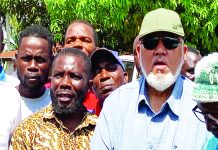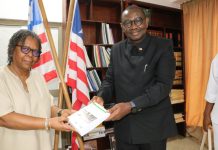Top: A drone photograph of a log yard in Greenville, Sinoe County. The DayLight/Derick Snyder
By Mark B. Newa
MONROVIA – Liberia is hosting an international forest and climate conference, expected to reassess the commitment of the Liberian government and the international community to the protection of the country’s rainforest, the largest in the west African region. The event comes amid widespread irregularities and impunity in Liberia’s forestry sector.
“Liberia remains committed to the global climate change agenda,” President George Weah said in the State of the Nation Address on Monday, announcing the event, which will take place on Wednesday at the Ministerial Complex in Congo Town.
“We are looking to improve governance of the forest sector and move toward a more effective management of our forest reserves, to help us transition to a better model of climate finance,” Weah said. He added Liberia is working to enlarge its protected areas and was committed to reducing reliance on commercial logging.
Delegates expected to attend the conference include envoys from the World Bank, and the ministers of environment and forests from Ghana, Sierra Leone, and Cote d`Ivoire are also expected to attend. The climate change special envoy of Norway—the country that provided Liberia with US$150 million to combat deforestation—and the Norwegian ambassador to Liberia are also expected to attend, organizers of the event say. The same goes for the European Union, which has had a logging trade agreement with Liberia since 2011, the United States Agency for International Development (USAID) and the United Kingdom.
Liberia hosts 43 percent of the last two significant blocks of the remaining closed canopy tropical rainforest within the Upper Guinea Forest, West Africa’ spanning from Ghana, Cote d`Ivoire, Liberia, Sierra Leone and Togo. Liberia has committed to conserving 30 percent of the existing forested areas of the country.
“There are doubts from some partners that Liberia is not moving in this direction, but the forest law says we should put under conservation at least 30 percent of all our remaining forest estates to conservation,” Saah David, Jr., the national coordinator of REDD+, one of the organizers of the event. REDD+ means reducing emissions from deforestation and forest degradation and the role of conservation, sustainable management of forests, and enhancement of forest carbon stocks in developing countries.
“The forum will be used as means to now push partners to also recommit to helping Liberia helps itself,” David added.
The conference, which was rescheduled from October last year, will feature experiences from Sierra Leone, Ivory Coast, Guinea and Ghana, a country that has just been enrolled into the global carbon financing program. Ghana is now the second country in Africa after Mozambique to receive payments from the World Bank for reducing its carbon emission.
The conference comes at a time the Liberian forestry sector is marred by illegalities. Associated Press recently reported that President George Weah ignored calls from foreign partners to tackle the illegalities in the forestry sector. The investigation report highlighted illegalities in the forestry sector. Liberia failed the natural resource management component of the Millennium Challenge Compact (MCC), an American agency that measures countries’ economic policies and potential for growth.
The report said Weah had ignored calls from the international community to address forestry non-compliance, saying they were “nonsense.”
The low budgetary allotment has been another issue. In the 2021/2022 fiscal year, the Forestry Development Authority (FDA) received just below US$2.9 million, more than 90 percent of which is employees’ salaries.
But there has been some progress made in the sector. Liberia has created the Sapo National Park, the East Nimba Nature Reserve, Lake Piso Multiple Use Reserve, and the Gola National Forest. It has begun the establishment of proposed protected areas: Kpo, Krahn-Bassa Foya and others.





Facebook Comments